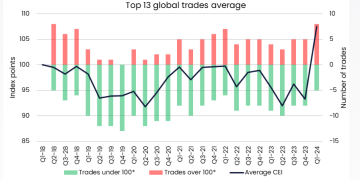Global climate change is not a side issue to our industry and world trade – it is of fundamental importance. The potential impact of changing weather patterns, sea levels and temperatures poses potentially enormous social, economic and political challenges for many regions across the world.
Slowing down or reversing the level of carbon emissions remains the most important environmental issue the world faces, and every sector of industry must share responsibility in trying to achieve this.
Environmental regulation is, of course, a necessary mechanism to help deliver effective reductions in carbon emissions and other pollutants. Nonetheless, regulators face significant challenges in pursuing an holistic policy approach that ensures the complex range of environmental measures are effective in their ultimate goal and that their overall impact – on the environment, society and industry – is fully assessed.
Sustainability is a key issue for the sector. Acknowledging its importance to the global shipping industry, sustainable maritime development was the key theme at the International Maritime Organisation’s (IMO) World Maritime Day 2013 on 26 September. However, sustainable development covers both social and economic sustainability as well as environmental sustainability. While environmental regulatory frameworks are a necessary and responsible response, the rising costs of compliance place a particularly significant financial burden on operating costs of smaller companies in the sector. This could have a significant impact on their sustainability as a business.
While shipping continues to be the most carbon-efficient and least environmentally harmful means of transporting goods and people around the world – contributing just 2.7 per cent of global greenhouse gases – the sector is committed to cutting further emissions and reducing its overall environmental impact.
Over the next 10 to 15 years, the shipping industry is set to invest hundreds of billions of dollars into environmental compliance. For example, meeting the requirements of the regulations applying to carbon, SOx, NOx, black carbon, ballast water, noise, waste disposal, pollution control and many more. However, as well as investing in the technical measures necessary to achieve this, the industry also has to bear the associated costs of administering an increasingly complex variety of reporting requirements and also, potentially, investment in one or more carbon-related market-based measures.
In addition, shipping is likely to be a major source of revenue for the United Nations Framework Convention on Climate Change (UNFCCC) Green Climate Fund (GCF). The GCF is a mechanism designed to transfer money from the developed to the developing world that could raise $100bn a year by 2020 to enable developing countries to fund climate adaptation and mitigation measures.
With such a plethora of regulatory issues for the industry to take on board, it should be incumbent on regulators to ensure that legislation supports and encourages early compliance, and is introduced in a pragmatic manner. This would not only provide certainty of outcome but would also ensure that the industry ends up in an even stronger environmental position by adopting even cleaner technologies sooner.
Within the EU, regulators should also be aware of the potential for well-intentioned environmental policies that affect shipping having unintended consequences elsewhere – such as by encouraging modal shifts in transport that create further emissions on land or, in the case of sulphur emissions, fuel switching that it is estimated will add 12m tonnes of CO2 in Europe alone.
Source: UK Chamber of Shipping
For more information you can read the UK Chamber of Shipping Annual Review 2013-14
In the beginning, I was straightforward with you propecia before and after has changed my existence. It has become much more fun, and now I have to run. Just as it is improbable to sit.




























































